Hanabi Deluxe is a surprisingly fun and beautiful cooperative game for 2-5 players. Your hand of cards is hidden only to you, and it’s up to the other players to give you the right information to help you find out what you have. Hanabi is a fast, fun game that plays well with a variety of players!
So at our store we have a fellow with one of those mystical board game walls, the guy who has played everything. He brought in this little card game called Hanabi and played it with several of our group members one day, and everyone seemed to like it. I wasn’t interested at all, because it just looks like numbers and colors. Meh, there are more complex and interesting games to get to!
Then our store got a copy of Hanabi Deluxe, and on one of our splurges, we picked it up. The mystical game shelf guy taught us the basics, and Chelsey and I have been hooked ever since.
Hanabi is a crazy good, crazy simple game with a lot of depth. The beauty of the game is that it is very fluid. Your strategy must change when dealing with new players or players with different experiences.
Important note: as I mentioned, our version of Hanabi is the deluxe version. That is the only version of the game we’ve played, and my impressions are based on that. This is important for the component section, since the card game is going to be much, MUCH more portable. I’ll discuss at the end of the review my thoughts on the original versus deluxe set.
Component Questions
How much space does the game take on the shelf?
The original version of Hanabi is tiny, with the box being about the size of a deck of cards. Ergo, it is highly portable. Hanabi Deluxe is a small box with some serious heft. Still, it takes up less space than most of the standard sized boxes we have.
Are there a lot of bits? What comes in the box?
Hanabi Deluxe comes with 60 thick tiles. These are like dominoes on steroids, and they can take up quite a bit of space on your table. You see, they need to be shuffled and placed face-down. Other than that, you’ll get some small tokens representing your mistakes and the clues. You’ll want to watch these small tokens, since they can be easily misplaced.
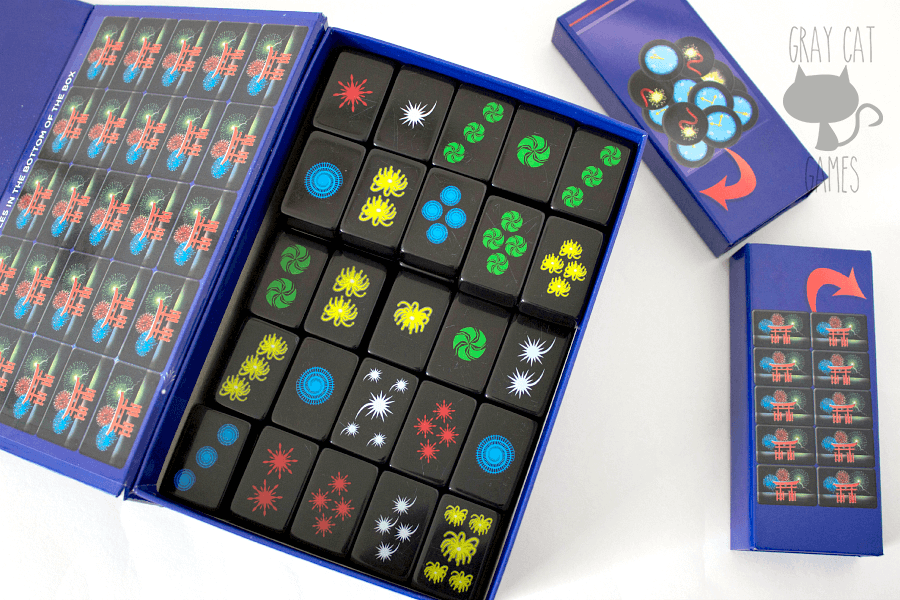
Are the components arranged in a well-thought-out fashion?
Yes! The tiles fit snug in the box, and there are these rectangular, thick pieces cardboard that can be used to hold the small tokens and take up the last bit of space. I think these little boxes could have used a flap of some kind, as the tokens often come spilling out if you aren’t careful. We’ve misplaced them on multiple occasions.
One thing I love about the arrangement of the box is how easy it makes the game to set up. If you placed all your tiles in the box face up, then you just have to flip it upside down, slide the lid out, and gently pull. Now the tiles are all on the table face down and are ready to be shuffled! It’s a great touch.
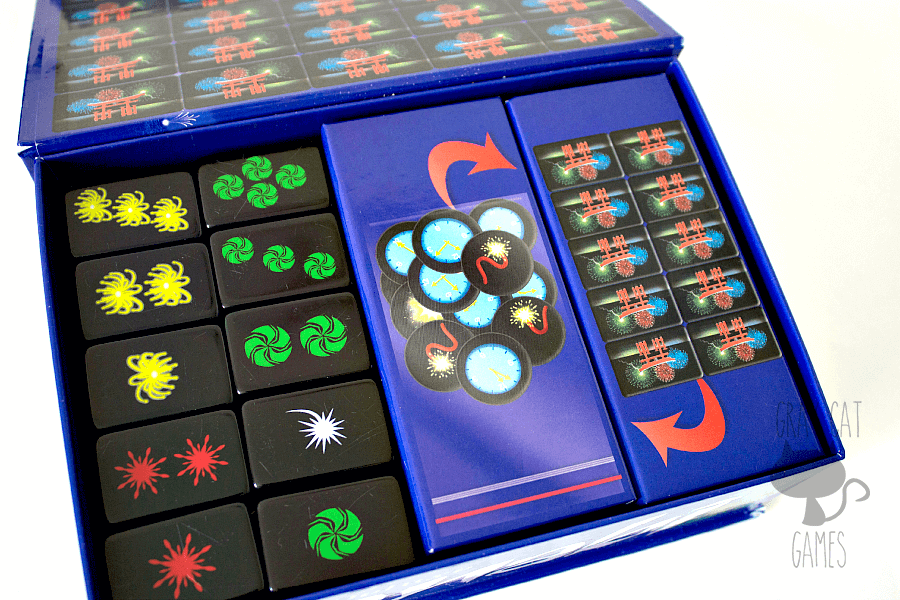
What do you think of the quality of the components and artwork?
Good golly, they’re nice. When I bought Hanabi Deluxe, I forgot that there was a card version that was about 80% lower in price (we paid $50 for the deluxe version, but the card game is only $10. Our version is now on Amazon for less than $40, though).
But honestly, nothing beats these tiles. The colors pop on them, they can be placed in front of people so they’re not holding cards the entire game. The tiles can be manipulated in a ton of ways to help you remember what you have.
The components of the deluxe version of Hanabi are stunning, full stop. The firework artwork on each is beautiful. What’s more, different color fireworks have different patterns, so color blind players can adapt and distinguish, say, the reds and the greens.
Gameplay Questions
What is the core mechanic?
In Hanabi, you are given several tiles that are placed facing away from you. All other players can see them, but not you. The goal of the game is to play tiles to assemble numbers 1 through 5 in each of the colors. For example, you need to play the green 1, then the 2, then the 3, and so on.

On your turn, you can do one of three things:
1) Flip a clue token and give a clue, which is limited to telling a player a number or a color (for example, “this tile is a 2” or “these tiles are all red”).
2) Play a tile; if it is an illegal play, you remove one of the fuse tokens. If you make 3 mistakes, game over!
3) Discard a tile to get a clue back. Since you only have a maximum of 8 clues, they run out fast and you need a way of getting them back.
If you lose a tile for some reason, you immediately replace it. The game ends once all the tiles are taken, and the players score based on how many tiles were played, up to a maximum of 25 points in the base game. (Based on 5 color game. If you add the “wild” tiles, which are multicolored, the highest score becomes 30.)
Is the game fiddly (are there a lot of manipulating pieces/math that slows the game down)?
No, there’s practically nothing slowing this game down. It gets tense very quickly, and there is an almost constant chatter among players trying to give the best clues and make the best plays.
Are the mechanics fun?
Yes, resoundingly. There’s so much to the logic of Hanabi, from giving the best clues to the deduction going on throughout the game. It’s a highly challenging logic puzzle to solve, and its simplicity is so beautiful. You’ll find yourself making tough, important decisions once those clues run out, and they run out FAST.
No two games seem to go the same, and it’s never easy. Even if you’ve scored the perfect 25, it doesn’t necessarily get easy. I’ve played in teams that got better and better, but I have never felt like I had this game licked.

Any color can be played at any time. But the numbers have to be played in order. This game is being played with the wild cards.
How many players does it support?
Up to 5. Though I’ve seen people try it with more. I personally have not played beyond the suggested player count. (Note from Chelsey: I once played a 6-player game in which everyone had three tiles instead of four. It was quite difficult and made the game feel more chaotic.)
How many players are best for the game?
This is a tough question for me. I think I’ve played it most with 2 players, Chelsey and me. This can be highly variable, because you can only see 5 tiles, and 10 total are in play. The more players you have, the more options there are to give clues. This adds to the complexity, but it also removes a bit of the randomness that can occur.
For example, in 2 player Hanabi we often find ourselves stuck because we could not find the first tile to start a color until late in the game. So if you can’t find that “White 1,” all those white tiles you’re holding are just taking up space. Throw them away, and you risk never being able to finish that suit.
With that said, going to the maximum player count can burn out the clues very quickly. You’re always limited to 8 clues, so players have to be very careful.
For me, I’d say Hanabi is a lot of fun for 2-5 players, and the feel can change a lot as you use different numbers. The sweet spot is probably in the 3-4 range for me, since this allows for discussion of the best clues and for players to see more tiles.
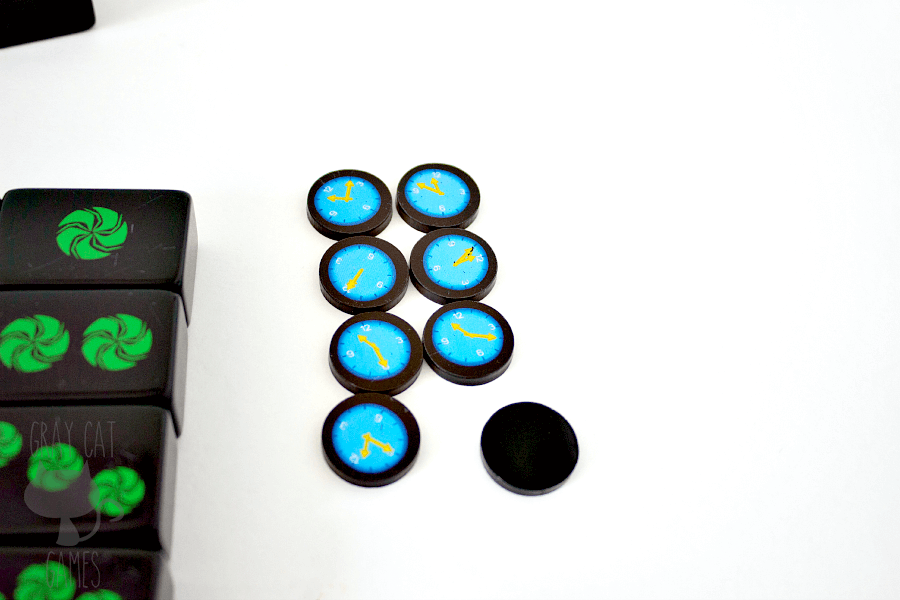
Clue tokens
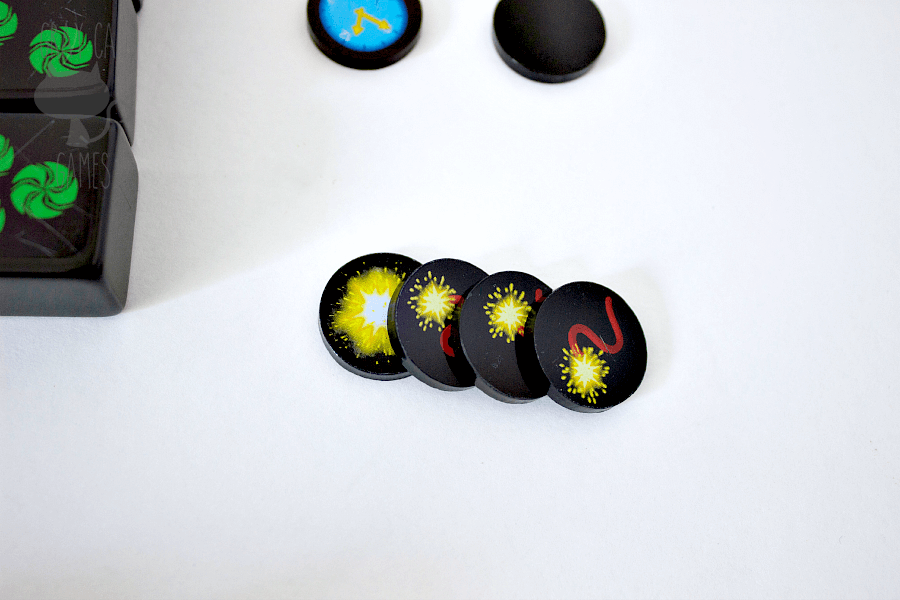
Illegal move tokens
Replayability Questions
Would you want to play this game next week?
Yes. Hanabi is quick to set up and quick to play. I rarely turn down an offer to play.
How many times would you like to play it in a given gaming session?
Once is usually good for me, since we’ve owned the game for a while. It is worth noting that the game comes with a 6th color suit, the rainbow. This adds a lot of difficulty, since these fireworks count as ALL colors. How this works depends on how you choose to play.
The way our group does it, you have to name a wild as one of the other colors (so if you see a blue tile and a wild tile, you have to say both are blue. You are not allowed to say, “This is a multi-colored tile”). However, the tile does not COUNT as other colors. Which means you can’t lay down a wild 1 and call it the blue suit.
At the same time, the maximum score is raised to 30. So if you feel like your group has gotten really good at Hanabi, you can raise the stakes.
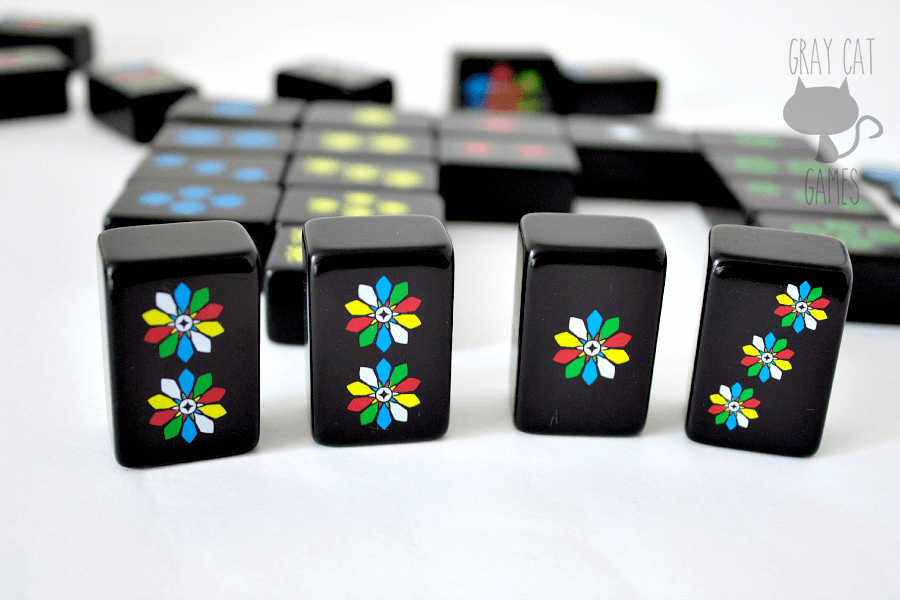
Overall, Hanabi has great replay value. You need to play it many times with a group in order to understand your teammates. For example, I know that Chelsey will conserve clues by discarding tiles early, so I need to try and communicate with her which tiles in her hand can be safely discarded as early as possible. Other players tend to wait until there are no clues left before they start to discard.
Still, others have different abilities to reason out what they have, so telling them “This is a 2” might or might not be enough information. Therefore, the game changes almost completely once you are in the context of another team.
Concluding/Misc Questions
How expensive is the game?
Deluxe Hanabi cost me $50. You can find this version on Amazon for $35 at the moment. The card game is substantially cheaper, $10 on Amazon. Was it worth it to buy the deluxe? I have mixed feelings. The components are amazing in there, and the box is awesome. It snaps shut with magnets and holds everything tight.
However, the cost is an impediment, and the card game is a lot more portable. You could play the original version on a train or bus. You can throw it in a hand bag. Deluxe Hanabi takes up some space, and I don’t find it particularly portable.
So for game day, I’ll take the deluxe version. I’m quite happy with it. If I wanted to play it on the road, I’d be longing for the card game.

What do you want people to know about this game?
Hanabi looks kind of…eh, when you first see it. But there’s a lot of depth here, and it’s a unique cooperative game. It’s rare to find a co-op game that doesn’t have you doing battle with some adversary together. It’s ever more rare to find a game where you are blind to your own cards. So if you want a unique, puzzling co-op game, Hanabi is a must-have.
Who do you think would most enjoy this game?
I think casual and more hardcore game players would enjoy this. If you hate puzzles, you might not like it so much. There is a lot of reasoning involved if you want to be successful. However, most of the people we have introduced this game to have loved it. Given how cheap the card version is, this is a low-risk proposition for anyone.
Buy the Deluxe Edition Now
If you like Hanabi, you might also enjoy:
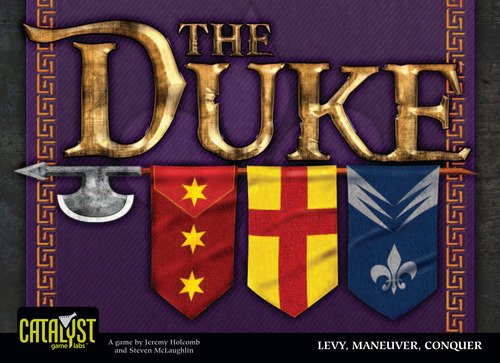
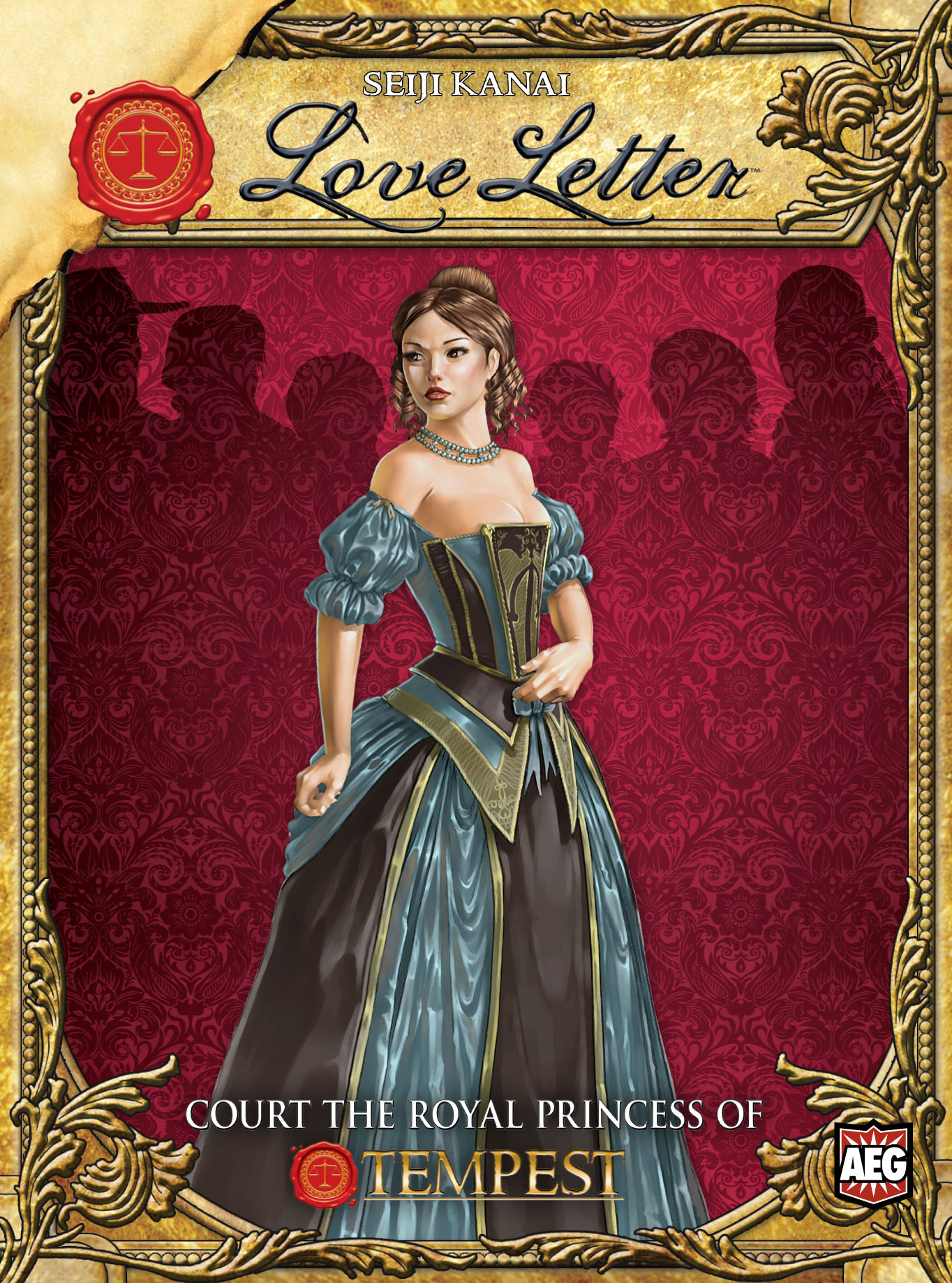
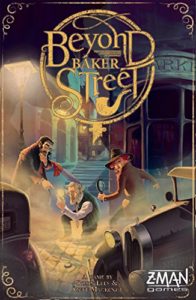
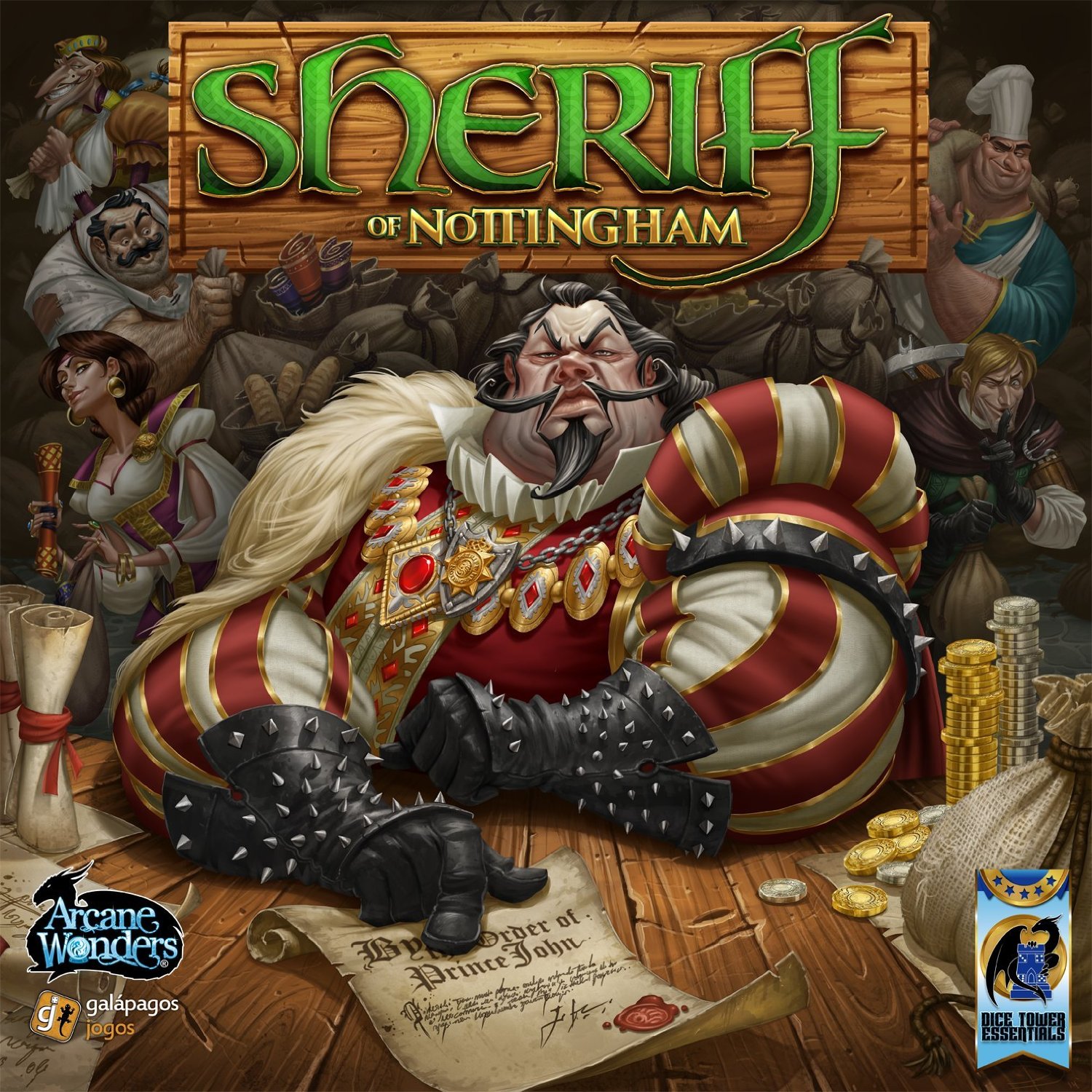
1 comment
What a glowing review of Hanabi